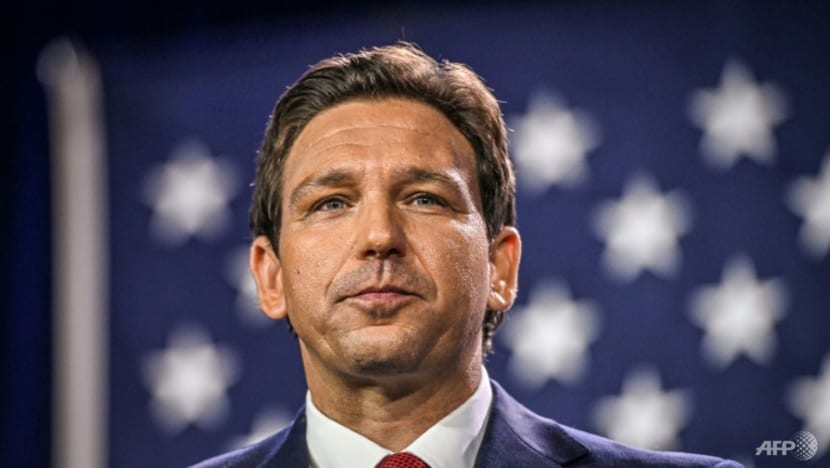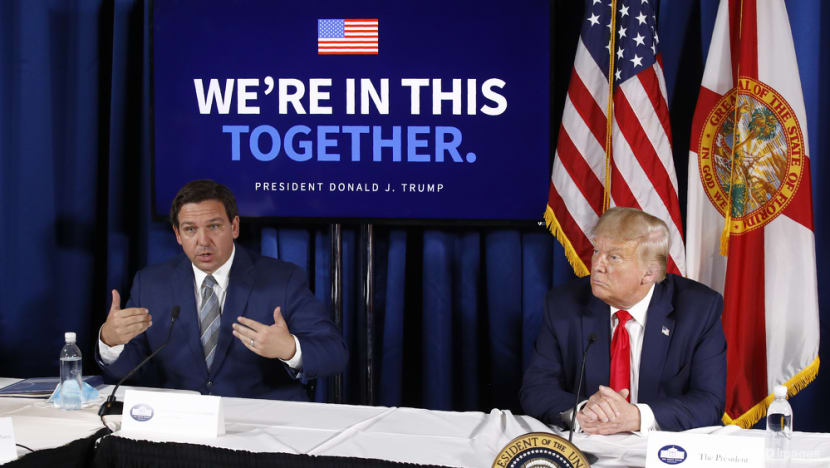Commentary: Yes, Ron DeSantis can recover and challenge Trump in the 2024 Republican race
Barack Obama and John McCain also trailed badly early in their presidential campaigns before going on to earn their parties’ nominations, says Jonathan Bernstein for Bloomberg Opinion.

SAN ANTONIO, Texas: Florida Governor Ron DeSantis on Wednesday (May 24) formally entered the presidential nomination race, albeit on the heels of a slump. He broke the string of negative stories that had some people wondering whether he would drop out before reaching this stage, through a chaotic live announcement hosted by Elon Musk on Twitter, which was marred by glitches.
But as DeSantis certainly knows, while slow starts in nationwide polls aren’t helpful, they can be overcome.
DeSantis may or may not wind up a serious challenger for the nomination in 2024. But presently, he is still the leading alternative to former US president Donald Trump. That’s not a bad position. Many eventual US presidential nominees suffer a protracted downturn along the way to winning in the primaries and caucuses.
PAST CANDIDATES HAVE FACED SIMILAR ORDEALS
The story DeSantis would perhaps most like to mimic would be that of Barack Obama in 2008. Obama didn’t have to compete with a former president, but he did face two strong candidates, senator and former first lady Hillary Clinton, and former senator John Edwards, the 2004 vice presidential nominee.
Obama, like DeSantis in 2022, got off to a strong start and established himself in a top group with Clinton and Edwards, but then spent the fall of 2007 failing to make any progress, actually falling further behind Clinton. It wasn’t until he won the Iowa caucuses in January 2008 that his campaign took off and carried him to the Democratic nomination, and, ultimately, the presidency.
There was an even more spectacular rebound in that election on the Republican side. Senator John McCain, the runner-up to future President George W Bush in 2000, began the 2008 cycle as the frontrunner, but things quickly went south. By July 2007 his campaign had practically collapsed.
Out of money and forced to cut expenses and staff, McCain was expected to drop out. Instead, he recovered and won the nomination relatively easily.

There have been plenty of other candidates who were faring poorly in the year before the election who went on to win the nomination, or at least managed to put their early struggles behind them.
Take senator Gary Hart, who started out as one of the promising alternatives to Walter Mondale in 1984 but failed to make headway throughout 1983.
Only when Hart finished a distant second in Iowa did he suddenly catch on, winning in New Hampshire and eventually finishing a close second to Mondale in the vote and delegate counts. Rick Santorum in 2012 had a similar, although not quite as successful, trajectory.
The lesson that candidates can surge from weak early polling might be even more relevant to Republican candidates, such as South Carolina Senator Tim Scott (whose support among Republicans is hovering at 2 per cent nationally); former United Nations Ambassador Nikki Haley (4 per cent); and former Arkansas Governor Asa Hutchinson (1 per cent); than it is to DeSantis, who is polling at a respectable 20 per cent or so nationwide.
Most Republican voters haven’t paid very much attention to the contest so far, and the race might look very different by the time they tune in.
NOT ALL WERE SO LUCKY
Of course, some candidates never recover from early setbacks. Kamala Harris in 2019 and Scott Walker in 2015 had difficulties that look a lot like what DeSantis is going through now and what Obama experienced in 2007, but both Harris and Walker wound up dropping out.
There are even more examples of candidates who, like Hart, poll in the low single digits in the year before the election - and stay that way until they quit.
As much as these precedents teach us, it isn’t clear how much they will apply to the current campaign. We’ve never had a former president vie for the nomination in the modern era. We’ve never had a frontrunner indicted, with more indictments potentially to come.
DESANTIS’ GAME PLAN
To challenge Trump, DeSantis more than anything will need to cultivate the support of influential party players. That effort, largely invisible to voters, involves convincing people within the party that he will be a good general election candidate and also be a good Republican president, successfully advancing the party agenda and priorities if he wins.
He has already at least partially accomplished one important aspect of the process, which is to convince everyone that he has a chance to win the nomination - few party actors with any sway want to waste their influence on supporting a go-nowhere candidate.
Or at least that’s what the old rules dictated. DeSantis is a big-state governor off to what would normally be a solid start as a presidential candidate. He already has lined up a huge cash arsenal that can be put toward his campaign. His very conservative record doesn’t have any obvious disqualifications for Republican voters.
Whether his particular emphasis on social conservative hot-button issues, such as attacking Walt Disney and supporting “don’t say gay” laws, is what Republicans in Iowa, New Hampshire and beyond are looking for is hard to say. Nor is it clear that a “Trump without the baggage” campaign will resonate with GOP voters, many of whom see Trump as an appealing character and a successful president.
That said, the most notable thing right now is that most candidates who seemed to be running a few months ago are still at it. This suggests that they don’t think Trump has the contest wrapped up - and that they also don’t think that Trump and DeSantis are the only plausible nominees.















